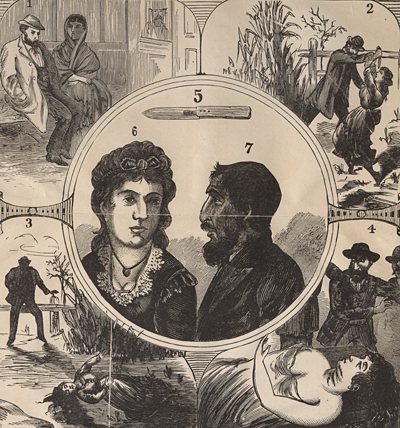Cornell University Library Digital Collections
Trial Pamphlets Collection
The Trials Pamphlet collection of the Cornell University Law Library consists of pamphlets printed from the late 1600s to the late 1800s. They are contemporary accounts of trials that involved prominent citizens or that dealt with especially controversial or lurid topics. These pamphlets were produced quickly and inexpensively, and then sold on the street soon after the trial to a mass audience. The paper used to print the pamphlets was of a lower quality (ephemera) and they were not bound; the pamphlets were not meant to survive much past their initial use. They were sold to an eager public both as a form of entertainment and as cautionary tales. Some include the details and illustrations of scandalous crimes and others include "execution sermons," which were meant to serve as moral examples to the readers. Most include information not available elsewhere, such as verbatim transcripts of testimony and arguments of counsel, depositions of parties, and illustrations or copies of evidence used in the trial.

Illustration from The Murdered Jewess
As a collection, these trial pamphlets are a unique resource that captures a formative period in American history from the early years of the republic, through the turmoil of the Civil War, to the emergence of the United States as a leading industrial nation in the late 1800s. They mirror the political, social, and economic transformation of the United States during this period. While each individual trial pamphlet provides a snapshot of a period in American legal and social history, by tracking the changes in the content of the pamphlets over time, researchers can track the evolution of the United States as it was reflected in the courts.
The collection contains a wealth of information about the daily lives of ordinary people of the period, with a special focus on the treatment of women and minorities. They also reflect society’s attitude towards issues such as capital punishment (Account of the short life and ignominious death of Stephen Merrill Clark : who was executed at Salem on Thursday the tenth day of May, 1821, at the early age of 16 years and 9 months, for the crime of arson), the institution of marriage (Marital power exemplified in Mrs. Packard’s trial, and self-defense from the charge of insanity, or, Three years’ imprisonment for religious belief, by the arbitrary will of a husband : with an appeal to the government to so change the laws as to protect), and abortion (Trial of Madame Restell, alias Ann Lohman for abortion and causing the death of Mrs. Purdy : Being a full account of all the proceedings on the trial, together with the suppressed evidence and editorial remarks). All are issues that American society still struggles with today. The collection also contains numerous accounts of trials associated with important events in American history. From the Civil War period, the collection includes pamphlets on the trial of John Brown for the raid on Harper’s Ferry; the trial of the conspirators for the assassination of President Lincoln; and the impeachment trial of President Andrew Johnson. Because cases were not officially reported on until the 1830s, the collection is one of the few ways to research trials from the 18th and early 19th centuries. In addition, the pamphlets in this collection document the transfer of legal traditions, and the biases within that system, from Great Britain to the United States. Thus, the collection is of immense value to legal historians as well as an important resource for historians, sociologists, criminologists, and other scholars.
The project received the American Association of Law Libraries Law Library Publication Award, non-print division in 2013.
Grant Project and Description
In 2011 the Save America’s Treasures grant program provided funding to enable Cornell University Library to restore and digitize this collection of mass-produced pamphlets. The Cornell University Law Library purchased the Trials Pamphlet Collection in 1927, when the pamphlets were bound together creating volumes that were difficult to use. Many of the bound volumes have deteriorated and the original pamphlets’ brittle pages are damaged, making them impossible for researchers to use. As part of conservation treatment, the volumes were individually bound, cleaned, and made chemically stable.

Pamphlet before restoration
Each pamphlet was also completely digitized and indexed online, allowing access to them both in person and online. All conservation and digitization work was done in-house at Cornell.
This is Cornell’s third Save America’s Treasures award. These grants have been administered by the National Endowment for the Humanities and the National Park Service through the federal Save America’s Treasures grant program, which supports the preservation of significant cultural heritage collections, sites and historic structures in the United States.
